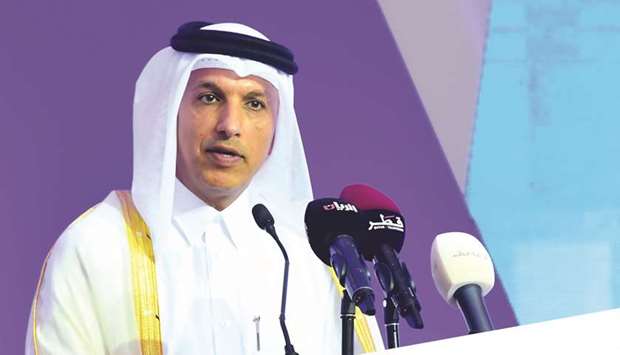The Middle East has a huge natural resource pool and financial capital yet the region’s economic conditions do not match its potential, leaving a “gap” that risks unrest and threaten economic development, thus requiring concerted multi-frontal efforts, Qatar’s Finance Minister HE Ali Sherif al-Emadi said yesterday.
Although the Middle East has enormous natural resources, huge financial capabilities and great human potential, which are all essential elements to achieve the desired economic development, these capabilities have not been effectively utilised, he said, addressing the 14th edition of Enriching Middle East’s Economic Future conference, organised by the Permanent Committee for Organising Conferences at the Ministry of Foreign Affairs in partnership with the UCLA Center for Middle East Development.
The actual economic conditions in the region do not correspond with the available potentials and that most countries suffer from declining economic performance, poor infrastructure and public utilities, increasing unemployment, poverty and widespread corruption, which pose a high risk of further unrest and threaten security, stability and development efforts in the region.
Stressing on the need to fill important “gaps” that hinder the development process, he said there was a need for integrated plans to develop vocational education and training, laws and legislation for the business environment, as well as support innovation and small and medium-sized enterprises and promote the participation of the private sector in economic activity.
He highlighted the importance of joint work to develop programmes and mechanisms to take advantage of the great potential in the region to achieve sustainable development and support security and stability for all countries of the Middle East.
The minister said the issue becomes all the more important considering the complex circumstances the world is witnessing. These include fundamental challenges and transformations in the economic arena and increasing protectionist policies and trade disputes between “big powers”, which affect the development and economic growth efforts in various regions of the world, including the Middle East.
HE the Minister said crises and serious challenges in the region won’t find the desired positive solutions “unless there is dialogue and consensus, and there is a sincere desire to meet with stakeholders and experts in order to develop a common vision to address the problems and crises escalating in the world, especially the Middle East.”
Joyce Banda, former President of Malawi, stressed the need for women empowerment, freedom of assembly, press and justice, in addition to addressing the challenges of climate change, especially as these things contribute directly to economic growth in the region.
Quoting a McKenzie Global Institute study, she said the global economy could grow by $28tn by 2025, a 26% increase, if women participated in the labour force to the same degree as men.
Edward Scicluna, Finance Minister of Malta, said there was a lack of inclusive growth in Europe, which also has to cope with a major issue of immigration as well as climate change.
“The fundamentals of European economy are strong but headwinds are creating uncertainty,” he added.
Hani K Findakly of Potomac Capital highlighted the challenges facing many countries in the Middle East such as the lack of job opportunities, the marginalisation of youth, unemployment, poverty, corruption and the failure to cope with the huge technological revolutions along with other factors that have a direct impact on economic growth.
He stressed on the need for countries in the region to benefit from these developments and adopt new constructive policies that contribute to social welfare and economic growth.

HE al-Emadi addresses the conference.

